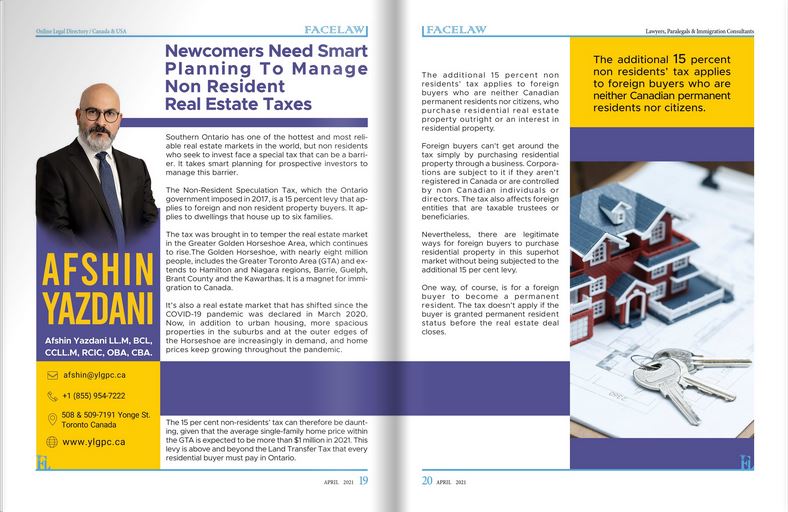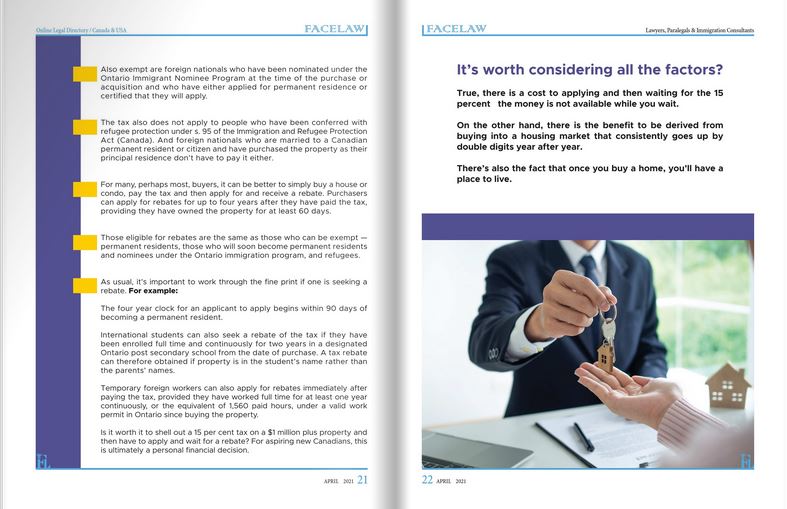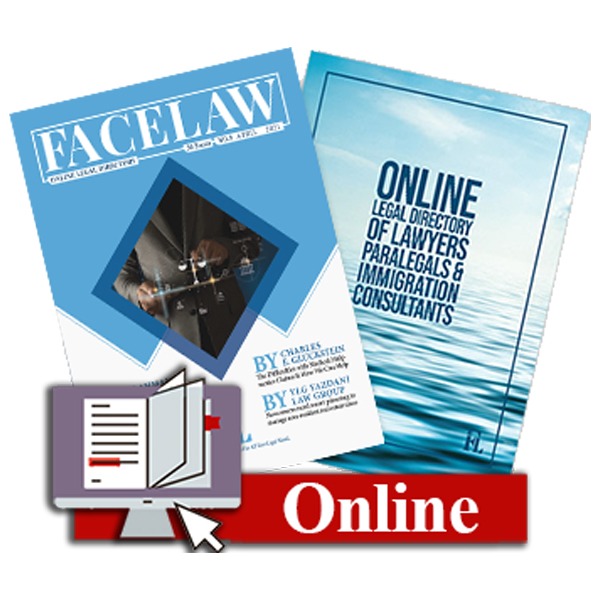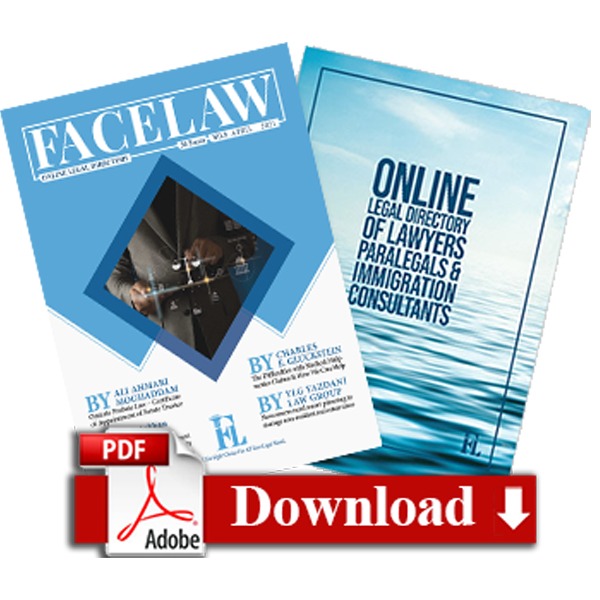Newcomers need smart planning to manage non-resident real estate taxes
Newcomers need smart planning to manage non- resident real estate taxes
By Afshin Yazdani
Southern Ontario has one of the hottest and most reliable real estate markets in the world, but non- residents who seek to invest face a special tax that can be a barrier. It takes smart planning for prospective investors to manage this barrier.
The Non-Resident Speculation Tax, which the Ontario government imposed in 2017, is a 15 per cent levy that applies to foreign and non- resident property buyers. It applies to dwellings that house up to six families.
The tax was brought in to temper the real estate market in the Greater Golden Horseshoe Area, which continues to rise. The Golden Horseshoe, with nearly eight million people, includes the Greater Toronto Area (GTA) and extends to Hamilton and Niagara regions, Barrie, Guelph, Brant County and the Kawarthas. It is a magnet for immigration to Canada.
It’s also a real estate market that has shifted since the COVID-19 pandemic was declared in March 2020. Now, in addition to urban housing, more spacious properties in the suburbs and at the outer edges of the Horseshoe are increasingly in demand, and home prices keep growing throughout the pandemic.
The 15 per cent non-residents’ tax can therefore be daunting, given that the average single-family home price within the GTA is ex-pected to be more than $1 million in 2021. This levy is above and beyond the Land Transfer Tax that every residential buyer must pay in Ontario.
The additional 15 per cent non-residents’ tax applies to foreign buy-ers who are neither Canadian permanent residents nor citizens, who purchase residential real estate property outright or an interest in residential property.
Foreign buyers can’t get around the tax simply by purchasing resi-dential property through a business. Corporations are subject to it if they aren’t registered in Canada or are controlled by non-Canadian individuals or directors. The tax also affects foreign entities that are taxable trustees or beneficiaries.
Nevertheless, there are legitimate ways for foreign buyers to pur-chase residential property in this super-hot market without being subjected to the additional 15 per cent levy.
One way, of course, is for a foreign buyer to become a permanent resident. The tax doesn’t apply if the buyer is granted permanent resident status before the real estate deal closes.
Also exempt are foreign nationals who have been nominated under the Ontario Immigrant Nominee Program at the time of the pur-chase or acquisition and who have either applied for permanent res-idence or certified that they will apply.
The tax also does not apply to people who have been conferred with refugee protection under s. 95 of the Immigration and Refugee Pro-tection Act (Canada). And foreign nationals who are married to a Canadian permanent resident or citizen and have purchased the property as their principal residence don’t have to pay it either.
For many, perhaps most, buyers, it can be better to simply buy a house or condo, pay the tax and then apply for and receive a rebate. Purchasers can apply for rebates for up to four years after they have paid the tax, providing they have owned the property for at least 60 days.
Those eligible for rebates are the same as those who can be exempt — permanent residents, those who will soon become permanent residents and nominees under the Ontario immigration program, and refugees.
As usual, it’s important to work through the fine print if one is seek-ing a rebate. For example:
The four-year clock for an applicant to apply begins within 90 days of becoming a permanent resident.
International students can also seek a rebate of the tax if they have been enrolled full time and continuously for two years in a designat-ed Ontario post-secondary school from the date of purchase. A tax rebate can therefore obtained if property is in the student’s name rather than the parents’ names.
Temporary foreign workers can also apply for rebates immediately after paying the tax, provided they have worked full time for at least one year continuously, or the equivalent of 1,560 paid hours, under a valid work permit in Ontario since buying the property.
Is it worth it to shell out a 15 per cent tax on a $1-million-plus property and then have to apply and wait for a rebate? For aspiring new Canadians, this is ultimately a personal financial decision.
It’s worth considering all the factors. True, there is a cost to applying and then waiting for the 15 per cent — the money is not available while you wait. On the other hand, there is the benefit to be derived from buying into a housing market that consistently goes up by double digits year after year.
There’s also the fact that once you buy a home, you’ll have a place to live.




Click here for go to Afshin Yazdani Page
lawyer in toronto
list of experience lawyers in toronto
top lawyer in toronto
list of lawyers in toronto
startup visa lawyer in toronto
caregiver visa lawyer in toronto
immigration lawyer in canada
canada immigration lawyer
student visa lawyers in canada
visitor visa lawyer in canada
startup immigration lawyer in canada
sponsorship immigration lawyer in canada
canada immigration consultants
immigration consultant in canada
immigration lawyer in toronto
toronto immigration lawyer
student visa lawyers in toronto
visitor visa lawyer in toronto
startup immigration lawyer in toronto
sponsorship immigration lawyer in toronto
immigration consultant in toronto


